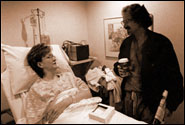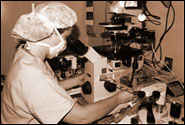Riding the IVF Roller Coaster
PATTI'S FIRST ROUND OF FERTILITY SHOTS last fall didn't work. Her eggs failed to develop properly. Just hours before she was to get a final shot preparing her for the surgical egg retrieval, her hormone levels plummeted and her doctor, reproductive endocrinologist Martin Freedman, reluctantly scrubbed the procedure. "You might get good eggs, they might fertilize and look wonderful on the day of transfer [back to Patti's uterus], but ultimately they would not continue to grow," Freedman said.
It was a big disappointment. Patti and Alex had to wait a few months, then regroup to try again. This is what infertility veterans call riding the IVF roller coaster. "Frequently you've invested a lot of everything," Alex said. "Your heart, your soul, your hopes, and your money. When it doesn't work it's very devastating."
 |
Dr. Martin Freedman visits with Patti just before the egg retreival procedure.
|
At 37 years old, Patti was sick of the shots, which made her feel lousy, and the emotional turmoil of struggling against biology. She thought briefly about giving up on another child. Then humor and hope returned, magnified by her husband's persuasive charm.
"I swore I would never do it again," Patti said, smiling impishly at Alex as they relaxed on the couch in their family room. "It's going to cost you." She laughed. "I have to decide what really expensive thing I'm going to have Alex buy me."
Alex mimicked astonishment. "So shallow!" he said. They both dissolved into laughter.
In January, Patti geared up for yet another IVF attempt. This time, the ovarian stimulation drugs worked. Early on a Saturday morning, Patti lay sedated in a procedure room, surrounded by Doctor Freedman and his medical team. Using an ultrasound probe, Freedman searched for eggs in Patti's ovaries. He expected to collect about a dozen.
 |
Embryologist Lisa Stumpo inspects Patti's eggs.
|
"What we're doing now is placing this needle under ultrasound guidance through the vagina into the ovary," Freedman explained as he stared at the flickering black-and-white screen on the ultrasound machine. The procedure sucks fluid from the ovarian follicles that produce eggs. An embryologist in the lab next door checked the fluid samples for eggs. Freedman's needle moved from follicle to follicle like a honeybee skimming from flower to flower in search of pollen.
"We've got egg number one," embryologist Lisa Stumpo called out.
After less than half an hour, Freedman pulled off his surgical mask and leaned in to give his groggy patient the final, triumphant score. "Patti, all done," he said. "We got seventeen eggs. I didn't think you had so many. Where did you come up with those extra eggs?"
Next: Hoping and Waiting
Twenty Years of Test-Tube Babies home
| 
